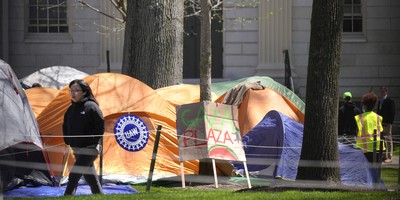In my defense, I clean up well for editorial board meetings.
I like to think I dress well for a newspaper writer. But face it; that's a low bar. I have a kiddie work wardrobe for the newsroom and an adult work wardrobe for the outside world.
Yet I'm also guilty of being glad when I read in the San Francisco Chronicle that the San Francisco County Superior Court has decided to enforce its 1996 dress code. No tank tops. No cutoff shorts. No beachwear.
I figure it's a good thing for the public and journalists to be able to tell court staff from the defendants. A few years ago, Chronicle columnist Leah Garchik wrote after she served on a jury about watching litigants and witnesses in a criminal trial -- "slumped, mumbling, sockless, with pants drooping, necklines gaping." They didn't seem to consider appearing in court "important enough to take seriously."
Like fashion, fashion crimes change. San Francisco County Superior Court CEO T. Michael Yuen told me he decided to enforce the dress code to prevent staffers from wearing sneakers, jeans, spandex and hoodies to work. About 90 percent of court staffers interact with the public, and it's important that they project a sense of respect for both the public and the judicial system.
Recommended
"This is not a gym," quoth Yuen. "We're also not a night club."
Yuen speaks affectionately of the tradition of requiring proper attire before the bar. California state law requires that judges wear black robes. In some countries, such as the United Kingdom, barristers have to wear wigs in court. In San Francisco, male lawyers can and have been made to wear ties before a judge.
The goal, court spokeswoman Ann E. Donlan explained, is not for 400 McAllister to be headquarters for the fashion police but to educate a professional workforce. In December, Yuen sent an email to personnel that noted many employees were dressing too casually and reminding them of the 1996 policy. Since then, supervisors have sent home two employees to change their outfits.
"Management goes out there, and they say the workers just want to come in in flip-flops," union organizer and former San Francisco Supervisor Chris Daly complained. Daly suggests that management is using the dress code to punish vocal rank and file and that it has been used "almost exclusively against women." Yuen would not disclose the gender of the disciplined staffers.
Some might find it odd that in what was a clothing-optional city until recently, officials would bar casual wear in the halls of justice.
Then there's the social justice angle. Is it even fair to make court clerks show up for work attired better than tech billionaires who uniformly sport jeans and hoodies? Yuen answered that most tech workers do not interact with the public but most court staff members do.
Because it's in San Francisco, Yuen did not implement the policy lightly. Managers took close to a year to consider obstacles and prepare. What about the cost? Yuen replied that the lowest salary for an entry-level job is $47,000 a year. The midrange is in the $70,000s. Court staff can afford decent duds.
One instance that led to new enforcement of the old policy involved a woman who went to pay a traffic fine. She complained upstairs that she wasn't sure whether the clerk in a hoodie really worked for the government. Since the December email, Yuen says, managers tell him that fewer members of the public are asking to speak to a supervisor.
It seems clothing can enhance or undermine a worker's authority.
Most staff members, Yuen told me, are "going above and beyond expectations."
Of course, I was wearing a suit to the interview with Yuen, so I showed him a photo of what I had worn to work the day before. "Would you send me home if I showed up for work like this?"
"I don't think we would send you home," Yuen answered.
Phew. Yet I wonder whether maybe I should step up my game. Not that I'll stop wearing jeans when I can get away with it, but maybe this story should make people ask whether they could do a better job of presenting themselves.
Yuen seems pleased. But I have to warn him: If someone offers him the job of CEO for the Chronicle, the dress code won't play well in the newsroom.

























Join the conversation as a VIP Member